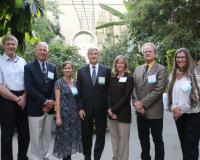
Vibrant Environment
Biodiversity
All | Biodiversity | Climate Change and Sustainability | Environmental Justice | Governance and Rule of Law | Land Use and Natural Resources | Oceans and Coasts | Pollution Control

On July 19, the U.S. Fish and Wildlife Service (FWS) and National Oceanic and Atmospheric Administration (NOAA) released their highly anticipated proposed changes to the rules implementing the Endangered Species Act (ESA). Enacted in 1973, the ESA is credited with saving iconic American species like the bald eagle and the grizzly bear. It is one of the hallmark pieces of legislation of the early environmental movement and the legislation for species conservation in the United States. While the public generally supports the Act, the ESA is notoriously controversial for corporations and agribusiness. Industries such as oil and gas, land development, and mining criticize the ESA as a costly barrier to project development. Supporters of the ESA highlight its role in preventing the extinction of species that are crucial to U.S. ecosystems.

“These places hold the world together,” said National Wetlands Awardee Latimore M. Smith of wetlands during his award acceptance speech. Simple words spoken to him early in his career as he explored a Louisiana bog, they continue to hold profound meaning and inspire him to this day. At the National Wetlands Awards ceremony that took place on May 9, 2018, in Washington, D.C., each of the six awardees shared stories about what inspired them in their efforts to protect and preserve wetlands.

The Pearl River map turtle, found only in Louisiana and Mississippi, has been described as the least-known species of the least-studied turtle genus in North America. Sadly, it may become extinct before it becomes known. While the species is recognized internationally and by the state of Mississippi, the U.S. government does not acknowledge it, and that obscurity is harming its existence. In the March issue of ELR’s News & Analysis, Kristina Alexander explains why listing under the Endangered Species Act (ESA) may be the only way to save it from extinction.

The Galician Association of Purse-Seine Vessel Owners (ACERGA by its acronym in Galician) is the largest association of purse-seine vessel owners in Spain. Over a year ago, ACERGA fishers and many members of their families camped in front of the main building of the government of Galicia (northwestern Spain), demanding that their voice be heard in the regulatory process for determining Spain’s annual fishing quota distribution of mackerel and horse mackerel.

It’s time to take the fight against wildlife trafficking from the jungles to the judges. The National Whistleblower Center (NWC) recently launched its Global Wildlife Whistleblower Program, and it is now seeking attorneys who are ready to join the vanguard by representing wildlife whistleblowers. This means helping whistleblowers develop effective reports and qualify for rewards under U.S. laws.

Human threats to pangolins in Zimbabwe have been kept in check for hundreds of years by traditional practices, but the recent globalization of illicit trade in these scaly, anteater-like mammals has threatened to exterminate them. Held in high regard by traditional chiefs, village headmen, and the tribal communities in general, the pangolin has historically benefitted from human protection in Africa. Zimbabwean folklore advised that the hunting of the pangolin (haka) be strictly controlled, and the deliberate taming of the pangolin was a serious offense.

ELI was founded in 1969—a time when U.S. environmental law was in its infancy and needed a place for cultivation and growth (an imperative that is still incredibly relevant today given the interconnectedness and severity of conservation challenges across the globe). At that moment in time, individuals across the country looked around and saw rivers catching on fire, poor air quality making it hard for children to breathe, and unfettered toxic pollution.